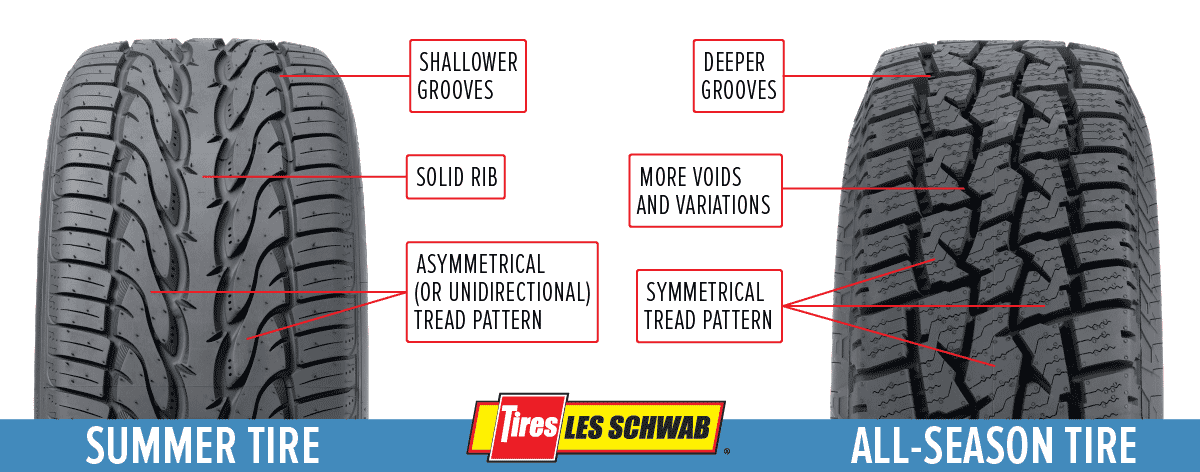
All tires that pass certain winter tire traction tests can be marked. All-season tires may perform adequately on dry warmer pavement but they wont give you the handling and grip levels of a summer tire.

The rubber composition of the all-season tire generally splits the difference between a winter tire and a summer tire so it can remain relatively flexible in freezing temperatures but also provide the rigidity to be effective in warmer climates.
Winter tire vs all season tire. Wintersnow tires will wear more quickly than all-season tires and their performance in winter will decline as they wear. As a best practice replace wintersnow tires. Snow-rated all-terrain tires certainly do a better job than summer tires of remaining pliable in cold temperatures but the pliability of winter tires in freezing.
Theres a great chance that your vehicle came from the factory with all-season tires which are suitable for a wide range of conditions temperatures and driving. Although all-season tires offer traction in a variety of different weather conditions winter tires surpass them when it comes to traction in snow and ice The tread life. The car equipped with winter tires stopped 66 percent faster 30 ft.
Shorter than the vehicle equipped with all-season tires. Since snow-on-snow contact creates far. At or about 42 degrees Fahrenheit an all-season and a winter tire have about the same traction however as the mercury drops the winter tire gains grip while.
All-season tires may perform adequately on dry warmer pavement but they wont give you the handling and grip levels of a summer tire. They may have a longer life than. Winter tires feature big blocky treads which move water and slush more efficiently and softer rubber that maintains flexibility in cold temperatures.
It turns out that all-season tires are fine in warmer months but in the snow they lack traction compared with dedicated snow tires. And that means that. There are two common grading systems for tires to help identify winter tire traction capabilities.
All tires that pass certain winter tire traction tests can be marked. A new type of tire is starting to become more widespread. This all-season tire is known as Premium Traction.
While they dont quite reach the performance of a true winter tire they come a lot closer than traditional all-season tires. If youre going to stick with all-season tires this is the standard. As a result of European tire laws 2 sets of tires per vehicle and seasonal tire rotation has long been the norm.
Winter Tires are fitted for November-April exact dates vary by country region then Winter Tires are rotated for Summer Tires when Old Man Winter checks out. Part 3- Check out a cool series of the difference In winter tire rubber vs all season tire rubber provided by our partners at Continental Tire. This is a hug.
Deciding if you need winter tires in Naperville. Being in the midwest its not a bad idea but are all seasons a safe enough compromise. 102 Naperville IL 60563 6303053054.
The rubber composition of the all-season tire generally splits the difference between a winter tire and a summer tire so it can remain relatively flexible in freezing temperatures but also provide the rigidity to be effective in warmer climates. And remember to re-mount those all-season tires when spring rolls around. While winter tires are undeniably superior in extreme winter conditions theyll wear down faster on warm dry pavement.
Shop Snow or All-Season tires and view product level tire technology details that are compatible with your driving needs. While an all-season tire will get you through the winter with decent traction on snow and ice a winter tire has a specific almost always softer compound designed to remain pliable and enhance traction in cold climates. These same compound traits make a winter tire a poor choice to run during the summer.